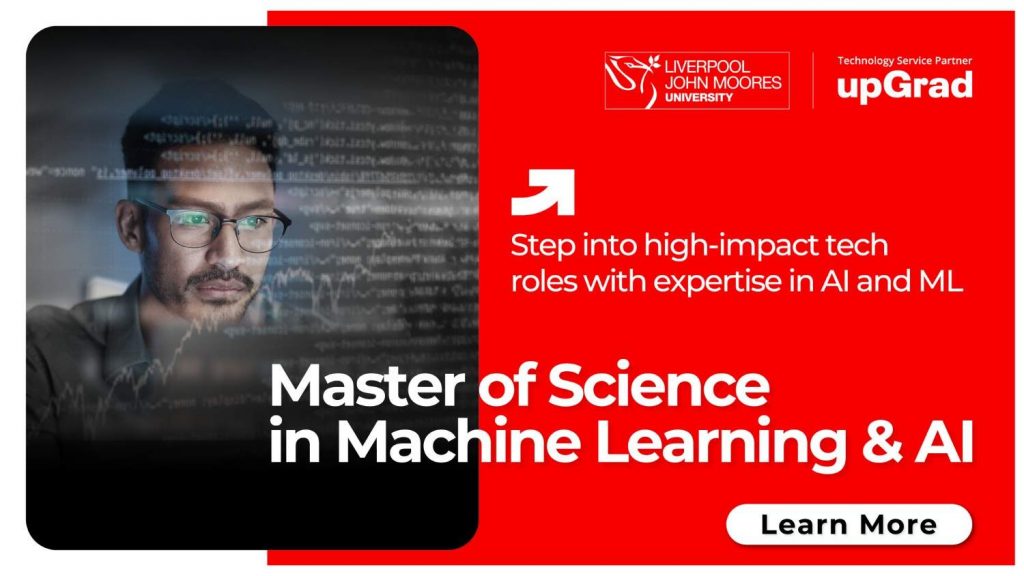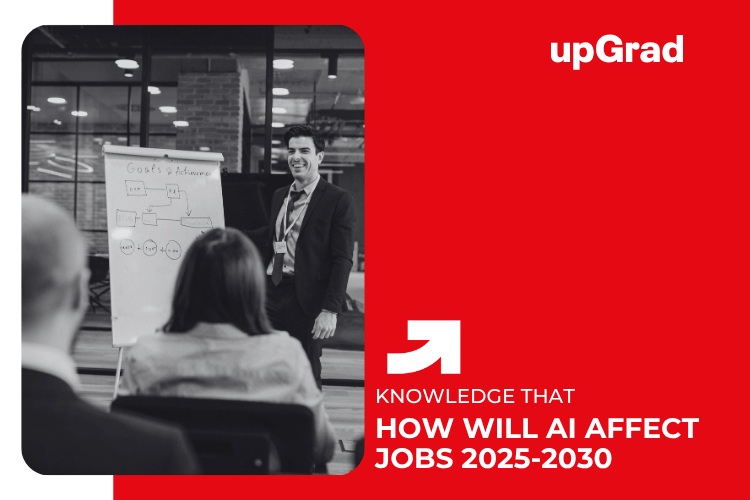Artificial intelligence is changing the landscape of work more quickly than ever before. Whether it is ChatGPT’s dominance, Google’s unveiling of AI that can analyze data, generate content, or create presentations, or new platforms like Gamma and Numerous AI, artificial intelligence is making headlines everywhere.
If you aren’t embracing AI, you might be lagging behind the curve at your job. In the next few years, those who embrace AI and learn to work with it will experience a whole new level of job opportunities and professional growth, while those who do not will likely fall further behind. Yes, AI will automate some jobs, but it will also create entirely new jobs for those ready to embrace change.
So, what types of jobs will AI affect the most? In this blog, let’s see the impact of artificial intelligence on employment to find out the most likely jobs that artificial intelligence will affect in the future and how.
Take your skills to the next level — Explore AI & ML Certification Online for Working Professionals
What Types of Jobs Will AI Affect the Most Between 2025 and 2030?
From 2025 to 2030, jobs that rely heavily on repetitive, routine tasks such as data entry, telemarketing, and basic customer service will be most affected by AI. Similarly, roles in data-heavy sectors like accounting and paralegal jobs will be significantly affected, as AI will be able to gather and analyze information. Predictable physical jobs in sectors like manufacturing, warehousing, and transportation will also be significantly affected by automation.
Jobs Most Likely to Be Automated
Jobs that involve routine, repetitive, data-intensive duties are most at risk of automation, including data entry clerks, telemarketers, bookkeepers, retail cashiers, and customer service representatives. AI can handle predictable, rule-based tasks, allowing human workers to engage in more complex or creative pursuits.
Jobs that are at the highest risk of automation:
- Customer Service Representative: AI chatbots and virtual assistants are now handling many customer inquiries.
- Data Entry and Clerical Jobs: AI thrives at processing and organizing large volumes of data.
- Bookkeeping and Accounting: AI automates the transfer of numbers and financial information.
- Telemarketing: AI can make phone calls and have more human-like conversations.
- Proof Readers and Copy Editors
- Market Research Analysts
Also read: Artificial Intelligence: A Beginner’s Guide
Jobs That Will Be Augmented by AI
Repetitive and data-heavy tasks in fields such as data entry, basic customer service, or administrative support will be deeply augmented by AI, allowing human workers to devote more attention to the complex, strategic, and creative parts of their jobs.
Jobs likely to be automated:
- Data Entry and Clerical Work
- Customer Service
- Data Analysis and Finance
- Creative and Design Roles

Jobs Least Likely to Be Affected by AI
Opportunities least affected by AI rely on uniquely human abilities, such as empathy, creativity, ethical judgment, and complex physical skills. While AI handles routine, data-driven tasks, it can’t replicate human intuition, strategic thinking, or emotional connection.
Some of the least likely to be affected jobs:
- Nurses and medical practitioners
- Mental health counselors and therapists
- Physical and occupational therapists
- Electricians, plumbers, and mechanics
- Chefs and bakers
- Artists, musicians, and writers
How to Adapt to AI
- Build human-centric skills: Strengthen abilities AI can’t replace, like creativity, emotional intelligence, and critical thinking.
- Work alongside AI: Learn to use and complement AI tools in areas like strategy, training, and oversight.
- Stay agile: Continuously upskill and adapt as job roles evolve in the AI-driven market.
- Embrace continuous learning: Stay open to learning and upskilling at any stage of your career.
- Learn to manage and analyze AI outputs.
Also read: The Future of AI and ML
The Rise of New Job Roles in the AI Era
With the advent of AI, the previously accepted labor-market framework of human-versus-machine has given way to human-AI collaborations. Central to this change, some repetitive human tasks have been automated, and new positions have emerged focusing on the development, supervision, and co-operation with AI systems. The human labor market has retained its emphasis on human capabilities such as creativity, emotional intelligence, and complex problem-solving, which AI cannot possess.
AI is displacing routine tasks, creating new types of jobs, and reimagining current roles. While specific jobs with repetitive tasks are at risk of displacement, AI is likely to augment human capabilities, enhancing productivity and innovation across industries. The long-term AI effect on jobs will depend on how successfully employees and organizations adapt through reskilling and focusing on distinctly unique skills.
Some emerging job roles in the AI era are:
- AI Content Creator
- AI Video Producer
- AI Ethicist
- Chief AI Officer (CAIO)
- Human-Machine Teaming Manager
- AI Policy Advisor
- AI Transformation Lead
- AI Business Consultant
- AI Research Scientist
- Data Annotator/Labeling Specialist
Also read: Top AI Jobs in the US
Future-Proof Your Career with upGrad: Learn the Skills to Thrive in an AI-Driven World.
upGrad can help future-proof your career by providing courses that prepare you to thrive in a world driven by AI. upGrad offers machine learning, data science, and other emerging courses in partnership with top global universities. These programs typically combine expert-led instruction and hands-on projects with features such as live sessions, mentorship, and career counseling to help professionals gain practical, job-ready skills. By taking these courses, you can develop the technical and soft skills needed to adapt to evolving industries and secure high-demand roles in the AI-led industries.
Here are some relevant programs to explore:
- LJMU’s Master of Science in Machine Learning & AI
- IIIT Bangalore’s Executive Diploma in Machine Learning and AI
- Executive Diploma in Data Science and AI from IIIT Bangalore
🎓 Explore Our Top-Rated Courses in United States
Take the next step in your career with industry-relevant online courses designed for working professionals in the United States.
- DBA Courses in United States
- Data Science Courses in United States
- MBA Courses in United States
- AI ML Courses in United States
- Digital Marketing Courses in United States
- Product Management Courses in United States
- Generative AI Courses in United States
FAQs on Effect of AI on Jobs
Jobs that entail a large volume of repetitive tasks, including but not limited to data entry, customer service, and administrative tasks, are most likely to be affected by AI. Other high-risk sectors include manufacturing, transportation, logistics, legal, and financial analysis, which require AI to perform routine tasks, analyze data, and handle basic information.
No, it’s unlikely that AI will completely displace human workers. Instead, AI will automate many tasks, enhance human capability, and create new forms of work. AI is likely to automate 5-6 % jobs completely in the coming time. It is also likely to automate parts of many jobs, leaving a space for humans to draw on creativity, emotional intelligence, and critical thinking skills that AI cannot replicate.
Customer services, manufacturing and warehousing, financial services, creative and media industries, transportation and logistics, among others.
To future-proof your career against AI, use AI tools, build skills that AI can’t replicate, and focus on learning and adaptability.Also, you don’t have to compete with AI; instead, learn to partner with it. Master AI tools, work on human skills such as creativity, communication, and think critically, and learn to be flexible and open to change to stay relevant with the AI impact on jobs.
The emergence of AI is creating jobs in areas like AI development, data science, ethics, and human-AI interaction. Related roles include prompt engineers, AI ethicists, AI trainers, AI implementation specialists, AI workflow designers, and human-machine teaming managers. These jobs involve developing, managing, and integrating new AI systems across every industry. Traditional jobs, such as data scientists, robotics engineers, and cybersecurity analysts, are also growing in demand due to AI.




















